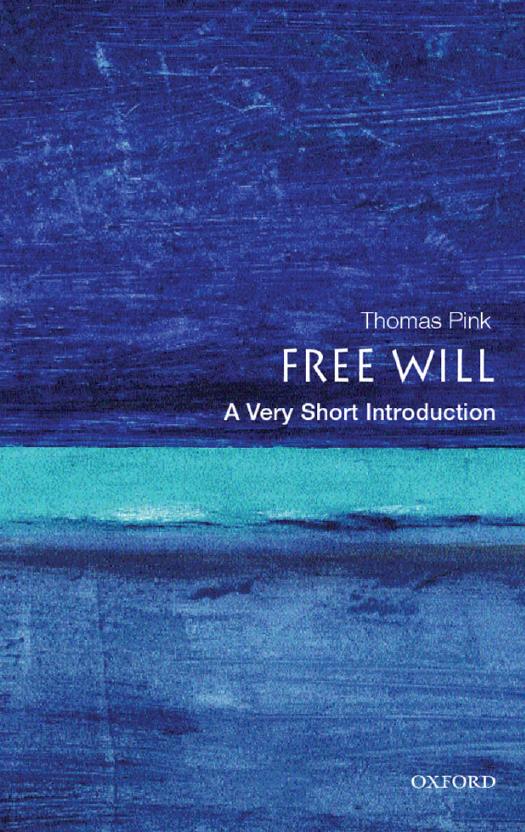Free will: a very short introduction by Thomas Pink

Author:Thomas Pink [Pink, Thomas]
Language: eng
Format: epub, pdf
Tags: Philosophy, Free Will & Determinism, Free will and determinism
ISBN: 9780192853585
Publisher: Oxford University Press US
Published: 2004-01-15T10:20:03.298000+00:00
Chapter 5 Morality without freedom?
Responsibility and self-determination
Ordinary moral thinking treats people as morally responsible for what they do or fail to do. Common sense takes moral obligation and moral responsibility to be for one’s actions or omissions and their consequences. We can only be under an obligation to do things or refrain from doing them. We cannot be under an obligation for things to happen independently of our own doing, or be responsible for such independent happenings.
It is here that the idea of freedom becomes important. Why should it be for our actions or omissions that we are responsible? The natural thought, as we have seen, is that our actions and omissions are our responsibility because we can determine for ourselves which actions we perform. Our action is our responsibility – how we act can be our fault – because our action is something that we determine for ourselves. Central to ordinary thinking about moral responsibility is the idea of self-determination. And the most natural conception of self-determination is a conception of it as freedom. Our action is something that we determine for ourselves in so far as it is our action that we control if we control anything. Where action is concerned, we can be responsible because we ourselves can be in control.
Freedom and voluntariness
But freedom is not the only possible conception of selfdetermination. Many philosophers have been convinced that something else lies behind our moral responsibility. Moral responsibility, these philosophers agree, is certainly still for how we act. And this is indeed still because moral responsibility presupposes some capacity for self-determination – a capacity to determine things for ourselves which we exercise in and through how we act. But this self-determination, the philosophers allege, has nothing to do with freedom. It is instead entirely to do with something rather different. Self-determination is exercised as voluntariness.
As I have already explained, voluntariness is doing what one wants or has decided to do because one wants or has decided to do it. Now Hobbes, we have seen, wanted to define freedom in terms of voluntariness. One has control over an action if one has the capacity to do it or not as one wills or wants. But we have seen that this identification of freedom with voluntariness must be a mistake. For we think we have control over our decisions – that we are free to decide otherwise than as we actually do – although our decisions cannot be taken voluntarily. We cannot take decisions just on the basis of having decided to take them.
In fact, freedom and voluntariness really are very different things. Just consider the differences.
Freedom links the performance of an action to the alternative of refraining from it, and says that each alternative is available. To say that an action is performed through exercising freedom is to say that it was also up to the agent not to perform the action. So freedom is a single capacity that can equally well be exercised in one of two ways: to perform an action or to refrain from performing it.
Download
Free will: a very short introduction by Thomas Pink.pdf
This site does not store any files on its server. We only index and link to content provided by other sites. Please contact the content providers to delete copyright contents if any and email us, we'll remove relevant links or contents immediately.
The remains of the day by Kazuo Ishiguro(8961)
Tools of Titans by Timothy Ferriss(8357)
Giovanni's Room by James Baldwin(7313)
The Black Swan by Nassim Nicholas Taleb(7095)
Inner Engineering: A Yogi's Guide to Joy by Sadhguru(6780)
The Way of Zen by Alan W. Watts(6589)
Asking the Right Questions: A Guide to Critical Thinking by M. Neil Browne & Stuart M. Keeley(5747)
The Power of Now: A Guide to Spiritual Enlightenment by Eckhart Tolle(5740)
The Six Wives Of Henry VIII (WOMEN IN HISTORY) by Fraser Antonia(5492)
Astrophysics for People in a Hurry by Neil DeGrasse Tyson(5172)
Housekeeping by Marilynne Robinson(4429)
12 Rules for Life by Jordan B. Peterson(4298)
Double Down (Diary of a Wimpy Kid Book 11) by Jeff Kinney(4257)
The Ethical Slut by Janet W. Hardy(4235)
Skin in the Game by Nassim Nicholas Taleb(4229)
Ikigai by Héctor García & Francesc Miralles(4228)
The Art of Happiness by The Dalai Lama(4118)
Skin in the Game: Hidden Asymmetries in Daily Life by Nassim Nicholas Taleb(3983)
Walking by Henry David Thoreau(3946)
